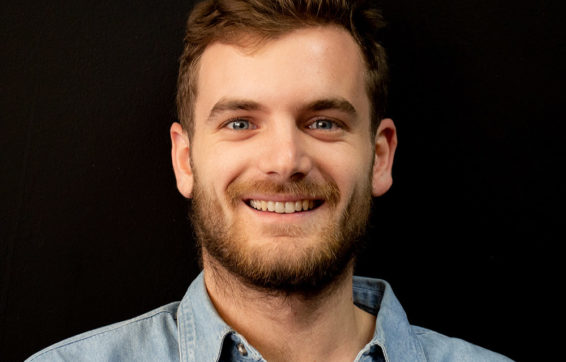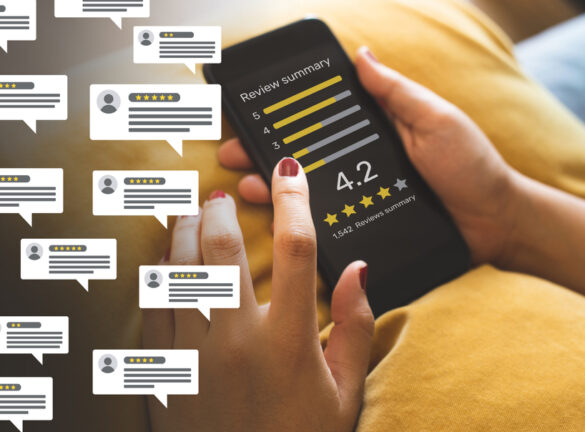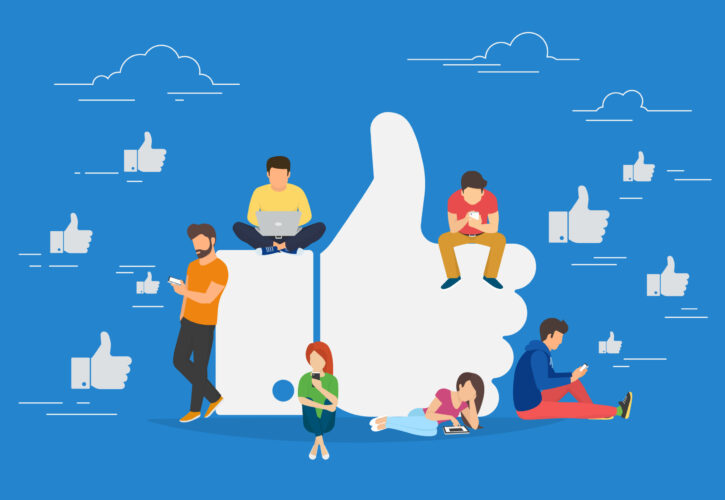
From Apathy to Enthusiasm: Will the COVID-19 Pandemic Cause Millennials to Fall Back in Love with Social Media?
Growing up with Social Media
Millenials (the generation born between 1981 and 1996) have had a long and complex relationship with social media.
For me, it all started with Bebo, the home of the brutal ‘top friends’ list where you could rank your favourite people. Next up was Facebook, in the era that people actually wrote statuses – usually about how much they hated homework.
Moving through the 2010s, there were various other short-lived players such as YikYak, the anonymous hyperlocal Twitter-style network which started off as a bit of fun then quickly spiralled into a hot-bed of anonymous cyber-bullying.
Then of course there was the big one, Instagram. An app that has been criticised for its role in creating a generation of anxious, image-obsessed individuals who will go to ridiculous lengths to appear as care-free, healthy and wealthy as possible.
For me, and many likeminded Millennials, it feels like instead of enabling us, social media has been disabling us, making us incapable of behaviours that used to be natural. Hence the commonly heard phrase; “I hate the idea of dating apps, but its so hard to meet people without them”.
A world without social media is an attractive, if somewhat unreachable, promised land to millennials. Or at least it was until about a week ago.
An Unprecedented Time
The past week has been surreal, scary and disorientating. No Millennial, and very few people alive today in the UK, have witnessed times like these.
A generation used to total freedom and total convenience, raised on a diet of Uber, Easyjet, Deliveroo, Amazon Prime and Tinder is now being told that they can’t do exactly what they want whenever they want to do it. And it feels a bit weird.
There have been countless effects of the drastic, enforced behaviour shifts caused by COVID-19, and I believe that a shift in our relationship with social media is one of them.
Data released today (24/3/20) by Global Web Index shows that 72% of millennials have upped their smartphone usage since the start of the coronavirus outbreak and 48% have been spending more time on social media.
So in these strange times, what platforms have we been flocking to?
WhatsApp has often been criticised in the past for its role in spreading misinformation in times of crisis, and as always there have been a lot of rumours flying around. However, there has also been a lot of viral content that has done a lot to lift spirits. When we’re all facing the same situation, content that addresses those circumstances perfectly seems to spread like wildfire, for example this viral voice note talking about how the government is going to use Wembley stadium as a giant lasagne dish in order to help feed the nation.
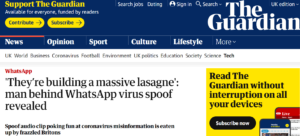
Is this the first Whatsapp voice note to be covered by national press?
Instagram, usually the home of the cocktail-on-the-beach style holiday post, has now become source of solidarity for those confined to their own homes.
The platform has been proactive in providing accurate information about the Corona Virus and has released a new ‘Stay Inside’ sticker to encourage social distancing.
Houseparty
This app that many people had never heard of a week a go has skyrocketed in popularity. Houseparty has been around since 2015 and was acquired last year by Epic Games, the company behind Fortnite.
The idea is simple, a video call app (and browser extension) where you get notified when friends go online and can easily jump into a call with friends around the world to chat and play games.
It’s fun and it will do a lot to combat loneliness over the coming months.
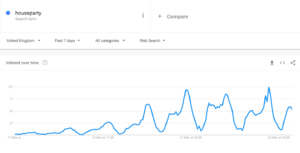
UK Google search trends for houseparty over the past 7 days
Netflix Party
An ingenious browser extension that allows you to enjoy watching a film or TV show with your friends or family without being in the same physical location as them.
Netflix Party synchronises the video for everyone in the group and opens up a chat so you can discuss whatever you’re watching in real time.
Sadly, the unexpected surge in new users has temporarily broken the service, but they expect to have it back up and running tomorrow.
Zoom
When does a video conferencing service become a social media platform? When people use start using it to chat to their friends.
As people steer clear of offices and the line between work-life and home-life blurs, so does the usage of platforms that were once reserved for one world or the other.
Zoom has become the go-to video conference service as companies have scrambled to get their workforces WFH ready. The question is will they take advantage of its fast-growing user base and pivot towards an after-work offering?
TikTok
In the marketing world everyone has been talking about TikTok for a while. But all the conversations we’ve had around it have been very much focussed on Gen Z.
However, as family groups are brought back together by working from home and shut schools, we’re likely to see people across more and more generations start using the app, if only to see what all the hype is about.
Will the Millennial older siblings and Gen X parents who try it get hooked? Does the right content exist for them on the platform? Is the algorithm good enough to find it for them? Only time will tell.
What’s Next?
In the short term, screen time will increase and people will seek out more and more ways to connect with the people they have been separated from.
Some platforms will emerge from this dark time with a larger, more diverse and more engaged user base than ever before.
Many Millennials will, either consciously or subconsciously, be currently reappraising their relationship with social media as it starts to deliver real value in delivering its mission statement of ‘bringing the world closer together’.
Perhaps it’s too early to tell, but maybe when all this is over Millennials will have fallen back in love with social media.
All I can say for certain is that it’s been years since I’ve seen my generation this enthusiastic about social media.
We hope you enjoyed our latest blog, if you have time, have a read of our latest from PR, How to PR a brand no one has ever heard of, with Content Marketing...


